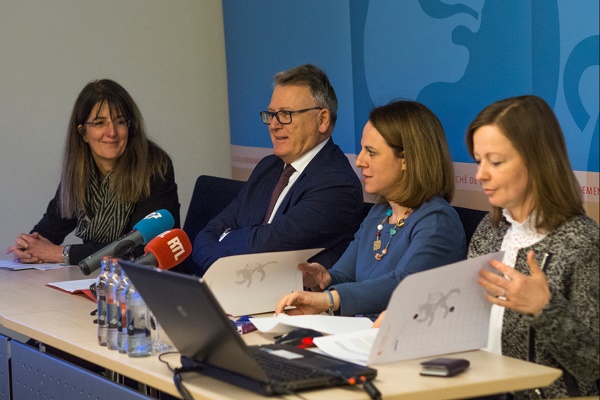 L-R: Gaby Wagner, Deputy Director of the (ADEM); Nicolas Schmit, Minister of Labour, Employment and Social and Solidarity Economy; Corinne Cahen, Minister of Family and Integration; Sandy Zoller, Ministry of Family, Integration and the Greater Region;
Credit: ADEM - Michiel Cammeraat
L-R: Gaby Wagner, Deputy Director of the (ADEM); Nicolas Schmit, Minister of Labour, Employment and Social and Solidarity Economy; Corinne Cahen, Minister of Family and Integration; Sandy Zoller, Ministry of Family, Integration and the Greater Region;
Credit: ADEM - Michiel Cammeraat
The Luxembourg government has presented the draft law completing the Labour Code by creating an employment inclusion assistance activity.
On 23 March 2018, Luxembourg Minister of Family and Integration Corinne Cahen, Minister of Labour, Employment and Social and Solidarity Economy Nicolas Schmit and the Deputy Director of the Agency for Employment Development (ADEM) Gaby Wagner presented the draft law on employment inclusion for employees with disabilities and outplaced employees.
The creation of this new activity called "Assistance for inclusion in employment" has two objectives: firstly, to facilitate sustainable professional inclusion and, above all, to maintain the employment of people with disabled worker status as well as employees on outplacement in the ordinary labour market; secondly, to encourage companies to hire more disabled and/or outplaced employees by offering them the possibility of using an approved external expert to support the process of professional inclusion in the company. The bill also provides for the possibility of taking over this assistance from the Employment Fund.
Assistance is requested jointly by the employer and the employee with a disability or outplacement. The agreement of the director of the ADEM gives right to the assumption by the Fund for the employment of the service of the assistant or the service of assistance for the number of hours and the duration envisaged in the project. The number of hours cannot exceed 300 hours and the duration cannot exceed 2 years if the employee benefits from a permanent contract and it cannot exceed the duration of the fixed-term contract or the ADEM employment measure.
The bill only targets employees with disabilities and outplacement who are hired by a private sector employer. In order to be able to supervise at best the numerous disabled and reclassified employees engaged with the State and the communes, it is envisaged that, for the civil service and the communal sector, a project similar to that of the assistance to the inclusion in the employment provided for in this bill be deployed from the psychosocial service.








